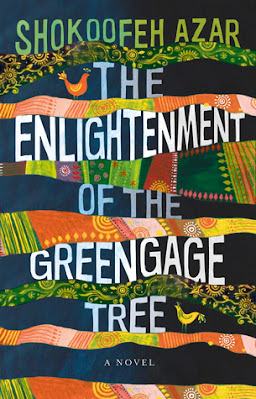 |
| The Enlightenment of the Greengage Tree / Shokoofeh Azar trans. from the Farsi by ? NY: Europa, 2020, c2017. 256 p. |
This read is one I've been meaning to get to for a while. It's the story of Iran through decades of governmental change and repression, from the 1979 Iranian revolution to recent years.
But it's also the story of one family and their tragic encounters with politics and religion in this totalitarian state. Reviews note that this book is told in a magical realism style, influenced by Persian storytelling traditions and newer writers like Marquez. This can be a good thing if you like it, and a stumbling block to the story if you don't.
I fall somewhere in between. While I generally like imaginative styles I don't think I was in the right mood for it here. I read the whole book carefully; I appreciated the family stories and the way they are bookish and cultured in the face of fanaticism. I found quite a lot to enjoy. But the endless interlinked, nested stories and the constant flights of fancy tired me out a little.
Nevertheless, this is an interesting read. Full of tragedy and awful events, it still has a lyrical style and approach to it all. It ties together ancient Iranian history (a group of Zoroastrian ghosts in their Razan home, for example) with modern, and shows it as a constant line. That was really effective and gives the sense of Iran as an ancient place that is only currently suffering from the dictatorship in power now.
The story is narrated by 13 year old Bahar, who we soon learn is a ghost. She was murdered in a revolutionary attack on her father's house and his musical instruments. As someone in the world of the dead, she has a kind of omniscience that the others don't. And she can tell the stories of her older brother Sohrab, arrested and executed; the story of her mother who leaves home to wander for many years, her sister Beeta who is changed into a mermaid, and her father, who leaves the tragic surroundings of the home in rural Razan where they'd moved to avoid political unrest in order to return to Tehran when his family has scattered.
Their stories are unlikely, infused with djinns, mermaids, spirits, and other mystical creatures and events. There are side characters who appear after their stories are told; and those who reappear in the village, broken loose from the Iranian past by becoming a modern, violent, absolutist soldier.
This book certainly gives a strong feel for the Iranian social climate, and the way oppression kills the imagination as much as it does actual lives. It feels like this book is a reclamation of that wild imagination that is the heritage of Iranians. I liked it but I don't know enough about Iranian history (or legends) to tell what is real and what is imagined, so it was a harder reading experience for me in that way.
I couldn't quite make up my mind about this novel. Parts of it were compelling and parts were ungainly and incoherent.
ReplyDeleteTheresa Kishkan (because your site won't accept my usual name and website information...)
I agree, some ungainly passages that made this one harder for me to read.
DeleteAnd thank you for persevering with your comment despite blogger's recent weirdness around commenting!